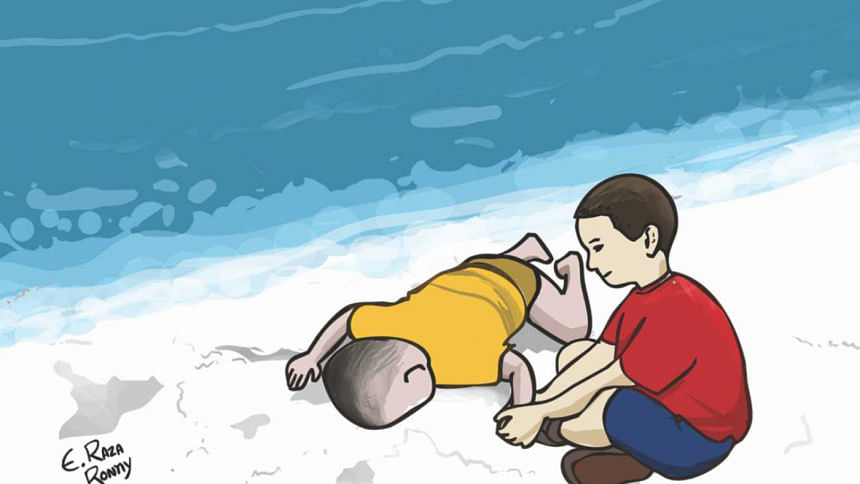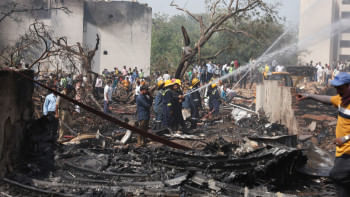The twin tragedies of Syria and Myanmar

A heart-wrenching photograph of the lifeless body of a 16-month old boy, washed up on the shore of the Naf river, was recently published on CNN. The headline read, "'The Rohingya Alan Kurdi': Will the world take notice now?" The name of the boy in the picture is Mohammed Shohayet, a Rohingya refugee, who drowned along with his mother, uncle and three-year-old brother. The image of Mohammed lying face down on the seashore is a dead ringer for Alan Kurdi, the Syrian boy whose riveting photo made global headlines more than a year ago.
While Alan and Mohammed hail from different countries, the circumstances which led to their premature deaths are very similar, and sadly, all too frequent. Both the Syrian war and the Rohingya tragedy see no end in sight. The Syrians and the Rohingya who have lived in their respective homelands for generations are being forced to make a journey across dangerous terrains and seas to seek refuge. To add to their dehumanising plight and sufferings, both the Syrians and Rohingya are being demonised by the West and Myanmar respectively—the Syrians for fleeing to countries which created the crisis in the first place, and the Rohingya, who, despite having lived in Myanmar for centuries, are being told they don't belong to the place they call home.
Although there is growing pressure on the international community to bring an end to these conflicts, survivor accounts and photos emerging from the ground are hardly evidence of any foreseeable change in the near future of the conditions of the Syrians and the Rohingya who continue to live in fear and uncertainty.
The headline of CNN's article "'The Rohingya Alan Kurdi': Will the world take notice now?" is a wishful one. What really changed, if anything, when mainstream media broke one of its 'golden rules' to never publish photos of dead children and went ahead disseminating the photo of Alan in 2015?
The 'Alan Kurdi Effect' at the time manifested itself in the form of the hashtag #RefugeesWelcome and a surge in sympathy for the millions of Syrians affected by the conflict now nearing the end of its sixth year. A study by the University of Sheffield also noted a change in online semantics—'refugees' versus 'migrants' (terms with distinct meanings with legal implications)—towards the Syrians, with 'refugees' being used increasingly. Many western nations agreed to take in a number of Syrian refugees while others closed their borders. Despite the outpouring of public concern, many argue that little changed for the Syrians as the death toll of total refugees and migrants fleeing to other countries actually increased from 4,664 deaths in the year before Alan Kurdi's death to 5,700 since (BBC, 2016).
So in light of the harrowing photo of Mohammed Shohayet, can we realistically expect anything to change for the Rohingya?
As we learnt from the Alan Kurdi saga, the power of social media has its limits and is far outweighed by the geo-political interests of world leaders and nation states. Whereas the proxy war in Syria plays out between world powers vying for regional hegemony through foreign intervention, the Rohingya crisis should be seen in the context of Myanmar as "one of the largest untapped markets in the world". It is no wonder that western powers like the US that profess to champion democracy and uphold civil liberties aren't doing much to exert pressure on Aung San Suu Kyi's government to take heed of the escalating Rohingya crisis.
As graphic images blur the lines between photojournalistic ethics and aesthetic taste in an age of violence and social media, and as world leaders do nothing in the face of the worst kinds of human sufferings of our time, one wonders, what will it take to prompt them into action and 'take notice', as the CNN headline asks?
Suu Kyi's landslide victory in Myanmar's first free elections in 25 years in November 2015, that ended decades of repressive military rule and were hailed as a "victory for democracy" in which the stateless Rohingya had no right to vote, serves the interests of nations whose primary aim is access to an open market to the former pariah state with its abundant natural resources, and who care very little about the protection of the rights of the Rohingya.
President Barack Obama formally announced the lifting of all US sanctions on Myanmar on October 7, 2016, ending three decades of strained relations between the countries. While Obama had been working towards rapprochement with the Southeast Asian nation for years, the removal of all trade restrictions are seen by many as a loss of leverage the US previously had on Myanmar's military which retains control over key ministries and core sectors of the economy. Just two days after Obama's formal announcement, the latest bout of violence in Rakhine State began, leading to the displacement of 30,000 Rohingyas.
The country of 53m, which has lived under the rule of the Tatmadaw, the Myanmarese military, from 1962 to 2011, is slowly transitioning into a democracy. Given the intricate relationship between democracy, basic values of freedom and respect for human rights, will the fate of the Rohingya, who are at the brink of mass genocide, change course? Not as long as political and economic interests of the international community prevail over humanitarian principles—both in the case of Syria and Myanmar.
As graphic images blur the lines between photojournalistic ethics and aesthetic taste in an age of violence and social media, and as world leaders do nothing in the face of the worst kinds of human sufferings of our time, one wonders, what will it take to prompt them into action and 'take notice', as the CNN headline asks?
The brutal truth symbolised by the images of Alan Kurdi and Mohammed Shohayet is best described in the words of Dimitri Beck, editor of the photojournalism magazine Polka in France: "It's not a sophisticated image, even in its framing, but the message is clear and direct: a kid has died and he's being picked up like a washed-up piece of wood on the beach. There's nothing more violent."
The writer is a member of the Editorial team at The Daily Star.
E-mail: [email protected]

 For all latest news, follow The Daily Star's Google News channel.
For all latest news, follow The Daily Star's Google News channel. 



Comments